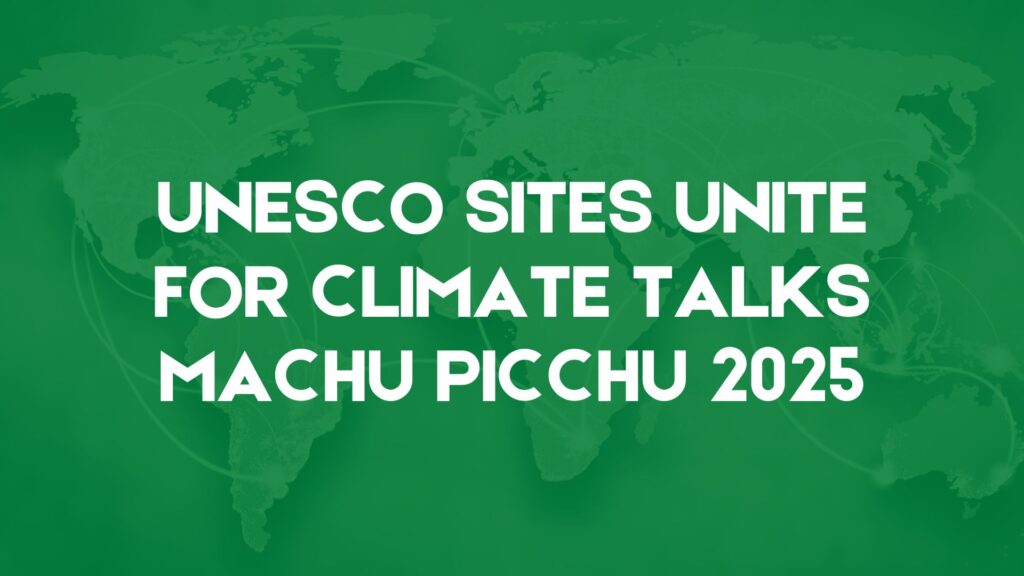Ahead of COP30, UNESCO World Heritage Sites Unite for Climate Action at Machu Picchu
Tourism is responsible for nearly 8% of global greenhouse gas emissions, placing destinations under growing pressure to decarbonize and integrate circular economy practices. Within this context, UNESCO World Heritage Sites stand at a crossroads. Their cultural and natural value is irreplaceable, and their visibility to millions of visitors makes them powerful platforms to prove that climate action and heritage preservation can go hand in hand. In November 2025, just days before the world gathers in Brazil for COP30, Machu Picchu — one of the most iconic UNESCO World Heritage Sites — will host Climate Talks Machu Picchu 2025. This historic high-level event will unite leaders from tourism, culture, and climate action, positioning heritage destinations as active players in shaping global climate solutions. A Historic First for Global Heritage For the first time, cultural and natural heritage sites will step onto the global stage of climate diplomacy. By aligning their preservation mission with ambitious decarbonization goals, these sites are sending a clear message: heritage is not only about safeguarding the past, but about shaping a livable future. At Climate Talks Machu Picchu 2025, World Heritage leaders will: COP30 Momentum With COP30 in Belém do Pará just around the corner, this initiative aims to inject fresh urgency into international climate negotiations. By placing heritage at the center of the climate agenda, world-renowned destinations are transforming from symbols of history into agents of change, amplifying their moral authority to inspire governments, industries, and communities. Workshop Circular Tourism, sponsored by AECID / CANATUR PERU Workshop on Circular Tourism, organized by Turismo Circular Perú — a national project led by CANATUR in collaboration with AECID. The workshop, delivered with the technical support of Green Initiative, will focus on strengthening local capacities to streamline best practices in circularity and decarbonization. By supporting Machu Picchu’s public and private stakeholders to streamline sustainable practices, the program seeks to enhance efficiency, reduce environmental impacts, and reinforce the destination’s role as a global benchmark in climate-smart and circular tourism. Celebrating Climate Leadership As part of the program, Climate Talks Machu Picchu 2025 will also host the 3rd Ceremony for the Carbon Neutral Certification of Machu Picchu, reaffirming the destination’s pioneering role as a benchmark in sustainable tourism. The agenda includes technical visits to explore circular economy practices in Machu Picchu, knowledge-sharing panels with representatives from Angkor Wat, Petra, the Galápagos, Taj Mahal, Bonito, and Tikal, and the signature of a global Call to Action. This milestone gathering will not only strengthen local and international collaboration but also celebrate tangible progress, ensuring that heritage sites lead by example in advancing climate neutrality. A Global Engagement The initiative is convened by the Municipality of Machu Picchu, CANATUR, Inkaterra, and the Green Initiative, with support from the German Embassy in Peru, the Peruvian Embassy in India, SEVEA (Cambodia), Cristo Redentor (Rio de Janeiro), and SERNANP, in collaboration with UN Tourism and the UNESCO Country Offices. Pedro Andrade Corrêa de Brito, International Relations Coordinator of Santuário Cristo Redentor, emphasized:“Cristo Redentor is not only a symbol of faith and unity for Brazil and the world, it is also a call to collective responsibility. By joining forces with Machu Picchu and other heritage icons, we reaffirm that protecting our most cherished cultural and natural treasures requires urgent climate action.” Gustavo Santos, Director of UN Tourism for the Americas, added:“Our vision for a thriving tourism sector, aligned with the great challenges humanity must overcome, is clear: tourism development and decarbonization can — and must — go hand in hand.” José Koechlin, President of Inkaterra, concluded:“Heritage destinations like Machu Picchu remind us that protecting the past is inseparable from safeguarding the future. By leading through example and working together across borders, we can turn climate ambition into pragmatic action. This is the responsibility of all parts of society — and the opportunity before us.” By aligning culture, nature, and tourism with ambitious climate goals, World Heritage Sites are sending a powerful message to the world: protecting our heritage means protecting our future. Machu Picchu will serve as the stage where history, culture, and climate converge, demonstrating how iconic destinations can lead by example and inspire change on a global scale. 📩 Media Inquiries and Participation Journalists interested in covering Climate Talks Machu Picchu 2025 or requesting further information are warmly invited to contact us at contact@greeninitiative.eco. Our team will be glad to provide press materials, facilitate interviews, and support media participation. The Green Initiative Team
Ahead of COP30, UNESCO World Heritage Sites Unite for Climate Action at Machu Picchu Read More »


